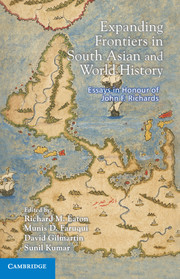Book contents
- Frontmatter
- Contents
- List of Contributors
- Foreword
- Introduction
- 1 At Empire's End: The Nizam, Hyderabad and Eighteenth-century India
- 2 The Ignored Elites: Turks, Mongols and a Persian Secretarial Class in the Early Delhi Sultanate
- 3 ‘Silk Road, Cotton Road or … Indo-Chinese Trade in Pre-European Times’
- 4 The Political Economy of Opium Smuggling in Early Nineteenth Century India: Leakage or Resistance?
- 5 Opium and the Company: Maritime Trade and Imperial Finances on Java, 1684–1796
- 6 The Mughals, the Sufi Shaikhs and the Formation of the Akbari Dispensation
- 7 Notes on Political Thought in Medieval and Early Modern South India
- 8 Becoming Turk the Rajput Way: Conversion and Identity in an Indian Warrior Narrative
- 9 Nature and Nurture on Imperial China's Frontiers
- 10 The Frontiers of Memory: What the Marathas Remembered of Vijayanagara
- 11 ‘Kiss My Foot,’ Said the King: Firearms, Diplomacy and the Battle for Raichur, 1520
- 12 Frontiers of Family Life: Early Modern Atlantic and Indian Ocean Worlds
- 13 Chinese Revenue Farms and Borders in Southeast Asia
- Publications
- Index
4 - The Political Economy of Opium Smuggling in Early Nineteenth Century India: Leakage or Resistance?
Published online by Cambridge University Press: 05 January 2014
- Frontmatter
- Contents
- List of Contributors
- Foreword
- Introduction
- 1 At Empire's End: The Nizam, Hyderabad and Eighteenth-century India
- 2 The Ignored Elites: Turks, Mongols and a Persian Secretarial Class in the Early Delhi Sultanate
- 3 ‘Silk Road, Cotton Road or … Indo-Chinese Trade in Pre-European Times’
- 4 The Political Economy of Opium Smuggling in Early Nineteenth Century India: Leakage or Resistance?
- 5 Opium and the Company: Maritime Trade and Imperial Finances on Java, 1684–1796
- 6 The Mughals, the Sufi Shaikhs and the Formation of the Akbari Dispensation
- 7 Notes on Political Thought in Medieval and Early Modern South India
- 8 Becoming Turk the Rajput Way: Conversion and Identity in an Indian Warrior Narrative
- 9 Nature and Nurture on Imperial China's Frontiers
- 10 The Frontiers of Memory: What the Marathas Remembered of Vijayanagara
- 11 ‘Kiss My Foot,’ Said the King: Firearms, Diplomacy and the Battle for Raichur, 1520
- 12 Frontiers of Family Life: Early Modern Atlantic and Indian Ocean Worlds
- 13 Chinese Revenue Farms and Borders in Southeast Asia
- Publications
- Index
Summary
INTRODUCTION
The link between narcotics, imperialism and capitalism has long attracted the attention of scholars. Recently, Carl Trocki has reiterated the classical Marxist position, dating back to Karl Marx himself, on the incestuous relationship between drugs and empire, while recognizing that the opium trade also nurtured certain forms of indigenous capitalism in Asia. While he has focused on the global Asian opium scene, including India, China and Southeast Asia, other scholars have given more attention to the Indian context of the trade. Amar Farooqi, in a book which is probably the most detailed history of the opium trade as seen from India, has stressed the contribution of the ‘illegal’ trade in Malwa opium to capital accumulation in Western India in the first three decades of the nineteenth century. John Richards, more than twenty years after his pathbreaking essay on peasant production of opium has returned to the topic with a wide-ranging survey of the contribution of the drug to the finances of British India. In this essay, I propose to revisit the history of the Malwa opium trade with a view to discussing both its general impact on capital accumulation in early nineteenth century western India and its link with imperial expansion. I shall focus more specifically on the case of Sindh, a largely neglected region of the subcontinent, whose transformation into the main smuggling route for the drug after 1819 was one of the factors that led to its integration into the British Indian Empire.
- Type
- Chapter
- Information
- Expanding Frontiers in South Asian and World HistoryEssays in Honour of John F. Richards, pp. 81 - 103Publisher: Cambridge University PressPrint publication year: 2013



